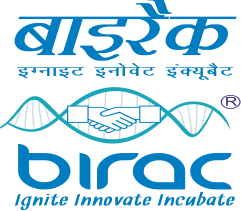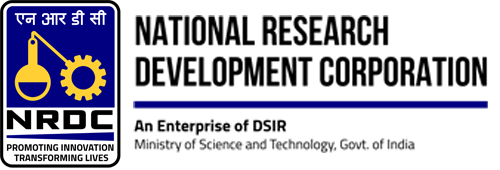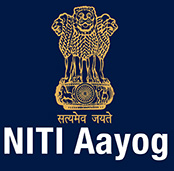Commercial enterprises, companies incorporated under the Companies Act, 1956 / the Companies Act 2013 (excluding sole entrepreneur / sole proprietorship /partnership concerns), cooperatives and other agencies are eligible to seek money from the Board for the development and application of technology-based products or services
If the project is for the commercialization of technology, developed by a domestic R&D institution, the enterprise should apply, along with an agreement signed by the R&D institution willing to transfer the technology. The R&D institution shall be any one of the following: -
- National laboratory
- State laboratory
- Academic institution
- Co-operative Research Association
- Registered R&D Foundation/Trust/Society
- In-house R&D unit in industry recognized by Government (Department of Scientific and Industrial Research)
- Organization recognized by Government (DSIR)
- Commercial R&D company recognized by DSIR
If an enterprise has developed the technology with the assistance of an R&D Institution (listed in above), the application to the Board by such enterprise or its associate will also be considered (contract or joint or output of sponsored research).
Applications from enterprises, with or without any other partners (as listed in above), for commercialization of indigenous technologies may also be considered.
Start-up companies and /or technocrat-entrepreneurs, with or without any other partners (listed in above), in product processing, information technology or designing and developing special engineering machinery are encouraged to apply for projects in these areas. Where legal title to domestically generated intellectual property is held (or filed for) by an individual generator (e.g., inventor) of such property or by an industrial concern, such individual or industrial concern shall also be eligible to apply.
If the activity is for adapting and commercializing imported technology, financial assistance from the Board may be provided for: -
- Effecting crucial modifications for wider domestic applications through an ‘R&D institution’ (listed in above) or through an individual) and/or
- Further development of commercialized technology is imported when that technology is at the ‘proof-of-concept’ or design stage.
The type of projects includes
- Development and commercialization of a new product/process / application through indigenous technology.
- Significant improvements in the existing product/process/application.
- Substantial quality upgradation, reduced material consumption, reduced energy consumption, cost reduction, improved competitiveness, improved ergonomics.
- Development and deployment of technology or design to satisfy existing occupational health and/or safety standards or improve upon them.
- Development and deployment of technology or design necessary to satisfy domestic or foreign environmental requirements or standards current or anticipated.
- Development and deployment of technology or design necessary to satisfy the requirements of domestic legislation and/or decisions of the judiciary or product liability legislation in export markets.
- Adaptation/modification to product/process which has been imported so as to make it suitable for wider domestic application.
- Replacement of imported raw materials/components with indigenous substitutes.
- Providing the socio-commercial viability of new and/or renewable sources of energy commercially deliverable to consumers.
- Development of technology to meet the medical standards and providing sociocommercial viability of bio-medical equipment and devices.
- Hazardous, waste recycling.
These may include:
- Development, test and evaluation necessary for establishing proof-ofapplicability of product, process or application.
- Costs of a capital nature including cost of acquisition of technology of foreign origin which is at “proof-of concept” or design stage requiring substantial indigenous technology development.
- Fabrication, testing and trial of prototypes.
- Setting-up pilot/demonstration plant including testing and trials.
- Industrial product design.
- Field trials (including limited market development, except as stand-alone activity)
- Setting-up the first or demonstrator commercial scale manufacturing unit using the innovative technology.
- Cost of studies, surveys and blue or grey-collar training necessary or incidental to the above.
- R&D / engineering consultancy for prototype / pilot plant / trials and testing.
However, the expenditure incurred by the Applicant before the date of application shall not be considered in determining the amount of loan from TDB.
The Technology Development Board (TDB) generally provides financial support to technologies at the mid-to-high levels of the Technology Readiness Level (TRL) spectrum, focusing on:
TRL 7 to TRL 9:
- TRL 7: Prototype demonstration in an operational environment.
- TRL 8: Complete and qualified system.
- TRL 9: Full commercial application, with proven market deployment.
TDB primarily funds technologies that are close to commercialization or require financial support to scale up and enter the market. Its goal is to bridge the gap between development and deployment, promoting innovative, market-ready technologies.
The proposal will be evaluated for its scientific, technological, commercial and financial merits. The assessment focuses on several key factors, including the completeness of the application, the objectives of the project, the current status of the technology, the applicant's track record, and the total cost of the project. Broadly, the evaluation criteria include The potential for wide application and the benefits expected to accrue from commercialization; the adequacy of the proposed effort; the capability of the R&D institution(s) in the proposed action network; the organisational and commercial capability of the enterprise including its internal accruals; the reasonableness of the proposed cost and financing pattern; Measurable objective, targets and milestones; Track record of the entrepreneur; The evaluation will also include on-site visits.
A duly constituted Initial Screening Committee (ISC) preliminarily examines the applications received for financial assistance. Based on the recommendations of the ISC, the application is further referred to the Project Evaluation (PEC) for a more detailed assessment and evaluation, including a visit to the project site. The Project Approval Committee (PAC) deliberates on PEC’s report and approves the project proposal.
An applicant is given a maximum of 2.5 years to complete the project. Thereafter, 01 year is a moratorium, generally given to adequately launch/market & generate revenue through the product. Hence, the project is considered complete after 2.5 years.
The repayment of the loan, together with interest and royalty thereon, shall commence one year after the project is successfully completed and shall be repaid in four and a half years. The accumulated interest up to the repayment of the first instalment may be distributed over a period of three years commencing from the second year of repayment and terminating in the fourth year of repayment.
- Refinancing.
- Basic research.
- Establishment of new R&D centre.
- Travel, conferences, workshops, etc. unless they form an essential component of the project approved by the Board.
- Writing of books or reports or collection of statistics or surveys unless they form an essential component of the project approved by the Board.
- Any form of grants-in-aid or loan for the mere creation of technical infrastructure. More than two projects at one time to an industrial concern.
- An industrial concern that is sick or incipiently sick.
The Board has adopted a proactive role, going beyond merely responding to proposals. This approach, includes:
- Enhancing exports and producing competitive consumer products.
- Encouraging industries and R&D institutions to innovate or improve products tailored for the Indian market.
- Focusing on technologies that are goal-oriented, socially relevant, and profitable.
- Identifying and acting in areas needing strategic intervention.
- Supporting innovative ideas from small enterprises, even at the risk of failure
- Leveraging the capabilities of national laboratories to lead in certain areas while acknowledging the strengths of Indian industries in modern technologies.
- Establishing formal linkages to create viable partnerships.
The Finance Act 1999 provides hundred per cent deductions for income tax purposes in respect of donations made to the Fund for Technology Development and Application being administered by the Technology Development Board.
All donations can be made online at https://tdb.gov.in/
(click the online payment button)
The Board accepts applications from all the sectors of the economy which include Health & Medical, Engineering, Chemical, Agriculture, IT, Telecom, Road & Air Transport, Defense, Energy & Waste, Textile etc.
The means of financial assistance from TDB include:
Loan: Up to 50% of the project cost at 5% simple annual interest in general. The committee can also recommend a loan of up to 70 %, but the loan amount should be up to Rs 5.0 (Crore)
Equity: Up to 25% of the project cost.
Grant: Provided in exceptional cases.
- The assistance is typically limited to half the approved outlay on eligible activities, considering the financial environment of the enterprise.
- The enterprise must provide evidence of securing the remaining funds, such as a commitment letter from a third-party investor, venture capital firm, financial institution, or commercial bank.
Interest Rate and Repayment Terms:
- The loan interest rate is 5% per annum (simple interest). Royalty payments are also required on product sales under the TDB project during the loan period.
- Collaterals and guarantees are mandatory for loans, interest, and royalty.
- Loan repayment starts one year after the successful completion of the project. It is repaid over 4.5 years in nine half-yearly instalments.
- Accumulated interest on the first instalment is distributed over three years, beginning in the second year of repayment and ending in the fourth year.
As per TDB guidelines, a year moratorium period is followed by 9 six monthly instalments.
The Technology Development Board (TDB) provides financial assistance in the form of loans to support technology-driven and innovative projects. The collateral requirements for availing of a loan from TDB may vary depending on the nature of the project, the risk assessment, and the specific terms of the funding agreement. However, the general requirements include hypothecation or mortgage of the assets created out of the project (equipment, machinery and other project-related assets). In addition to the primary security, TDB may require additional collateral security in the form of Fixed assets (land, buildings, etc.) owned by the company or promoters, Bank guarantees, Corporate guarantees, Pledged shares (not mandatory), bonds, Pari-passu charges as required, insurance of assets of the Borrower or other financial instruments. The quantum of collateral may also depend on TDB's assessment of the project's technical and financial viability and risk factors. The above are indicative for details It is advisable to directly consult TDB to understand the precise requirements for your specific project.
The Board does not levy any processing, administrative or commitment charges from the applicant. The company shall deposit 1% of the financial assistance sought with TDB as Earnest fee that shall be forfeited in case the company doesn’t sign the loan agreement post-issuance of LOI.
No, the company is required to submit a single proposal at a time, which must include all relevant project details and accompanying documentation.
The size of the token amount is not fixed and is entirely contingent upon the specific requirements of the project.
No, the applicant is expected to fill the form him/herself, however, in case of a technical issue, you can reach out to us by email :
Applications can be submitted throughout the year. The process typically involves submitting an online application form along with a detailed project proposal and supporting documents.
The evaluation and approval process typically takes 3-4 months from the date of receipt of the complete application, subject to the project's complexity and the applicant's responsiveness.
DPIIT-registered startups incorporated under Companies, 1956 or Companies Act, 2013 are eligible to apply for funding at TDB. Startups applying for a dedicated project with an overall cost of up to Rs. 5 Crore can be funded up to 70% of the project cost (unlike 50% for non-startups).DPIIT-registered startups incorporated under Companies, 1956 or Companies Act, 2013 are eligible to apply for funding at TDB. Startups applying for a dedicated project with an overall cost of up to Rs. 5 Crore can be funded up to 70% of the project cost (unlike 50% for non-startups).
The international division of TDB gives a special bilateral call annually to support Indian Industrial concerns for carrying out collaborative Industrial R&D grant. Presently, TDB provides support for collaborative Industrial R&D with the following countries: Israel, UK, Sweden, Spain, Singapore and Canada.
In TDB’s context Collaborative R&D involves two or more industry partners from India and any other country working together to jointly develop new products, technologies, or solutions.
Global Innovation & Technology Alliance (GITA) was a public-private partnership company between DST, TDB and the Confederation of Indian Industry (CII). TDB has subsumed GITA in 2022 and created its own International Division to support Collaborative Industrial R & D. The old projects under GITA have been transferred to TDB.
No, the Technology Development Board (TDB) does not officially authorize any external agency for filling out application forms or providing support in the application process. All applicants are encouraged to directly engage with TDB through their official channels for accurate guidance and assistance. If any thirdparty agency claims to be authorized by TDB to fill out forms or facilitate funding, it should be treated with caution. Always cross-check with TDB's official communication channels to avoid scams or misinformation.
Technology Development Board (TDB) encourages borrowers to repay their loans ahead of schedule, improving their creditworthiness and benefiting TDB by enhancing its fund liquidity as per the terms and conditions of the agreement
To learn more about TDB and its activities, you can visit their official website at www.tdb.gov.in. Additionally, you can physically visit their office at Technology Development Board, 2nd Floor, Block B, Department of Science and Technology, Technology Bhawan, New Delhi.








